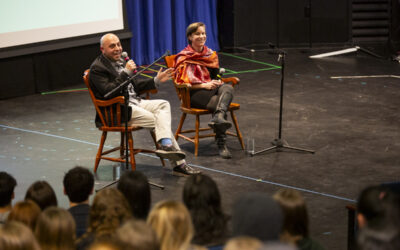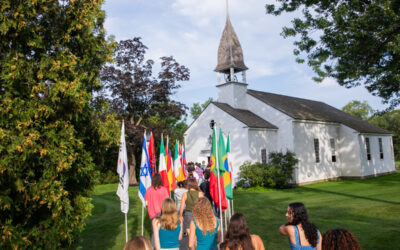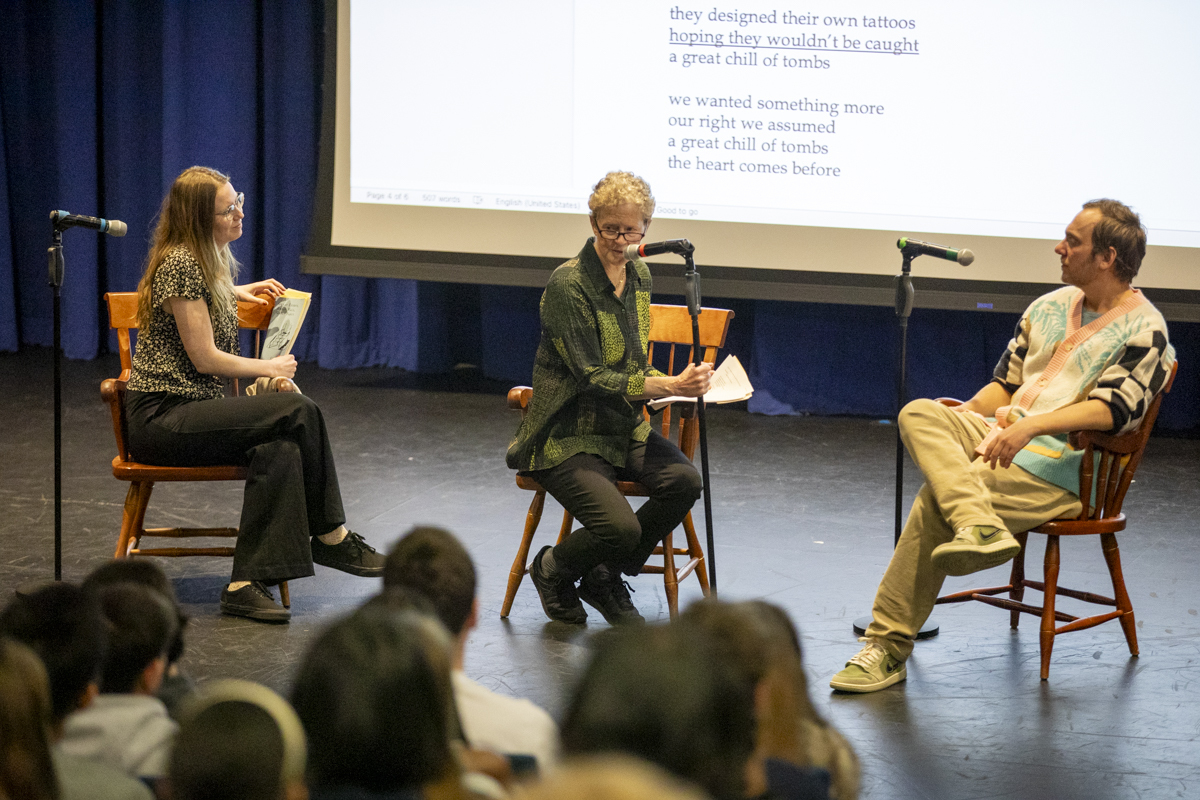
At an all-school assembly on March 27, 2024, three poets with ties to Concord Academy—a former teacher and two alums—shared the stage of the Performing Arts Center. They took turns reading from their work, then together reflected on why and how they write. English teacher Sabrina Sadique, who had organized the gathering in honor of the upcoming National Poetry Month, encouraged students to engage in listening as a “deeply meditative exercise.” In her introduction, she celebrated the bond created between teachers and students of writing—in her words, a “lineage of poetic fire.”
English teacher Laurence Vanleynseele P’22 introduced Cammy Thomas P’08, who taught English at CA for 14 years before retiring in 2017. Thomas’s new letterpress chapbook, Odysseus’ Daughter, has just been released. Of three previously published poetry collections, Cathedral of Wish received the Norma Faber First Book Award from the Poetry Society of America and Tremors received 2022 Poetry Honors from the Mass Book Awards. Vanleynseele spoke about the interconnected literary exploration that Thomas—her friend, mentor, and co-creator of several enduring CA courses—epitomizes: “transmissions across time and space from poets to readers and back and forth between teachers, mentors, students, and friends.”
Poetry Club co-heads Sam Klein ’24 and Smile Jiang ’24 introduced two of Thomas’ former students, now published poets themselves. Both had also been Poetry Club co-heads in their days.
Soren Stockman ’07, whose poems have appeared in Bennington Review, The Iowa Review, Michigan Quarterly Review, Narrative, PEN Poetry Series, Tin House, and other prestigious literary journals, took the podium first. He had been drawn to start writing poetry as a teenager because “it felt like a kind of alchemy,” he said. “It felt like it was possible to write something down and, by virtue of processing those thoughts and memories, change the way a thing feels in retrospect—and if you change the way a thing feels, you change the thing itself.” He read several poems from his 2022 debut collection, Elephant, commanding attention through gesture and intonation that held the weight of his words.
Chessy Normile ’09 brought a different energy to the stage, noting that her poetic and everyday voices are quite similar. She joked that she had begun regressing to her teenage self en route to Concord (her glasses broke on the plane; she recalled going through most of high school with them taped together). The 2022–23 Ronald Wallace Poetry Fellow at the Wisconsin Institute for Creative Writing, who earned an MFA in poetry from the Michener Center for Writers at UT-Austin, shared how moved she was to share the stage with Thomas, who had encouraged her early writing attempts, even though Normile described herself as “not a great student.” Dry humor suffused the poems she read from Great Exodus, Great Wall, Great Party, her debut collection, which won the 2020 APR/Honickman First Book Prize. They were, as she said, “poems about stuff I experienced here at CA.”
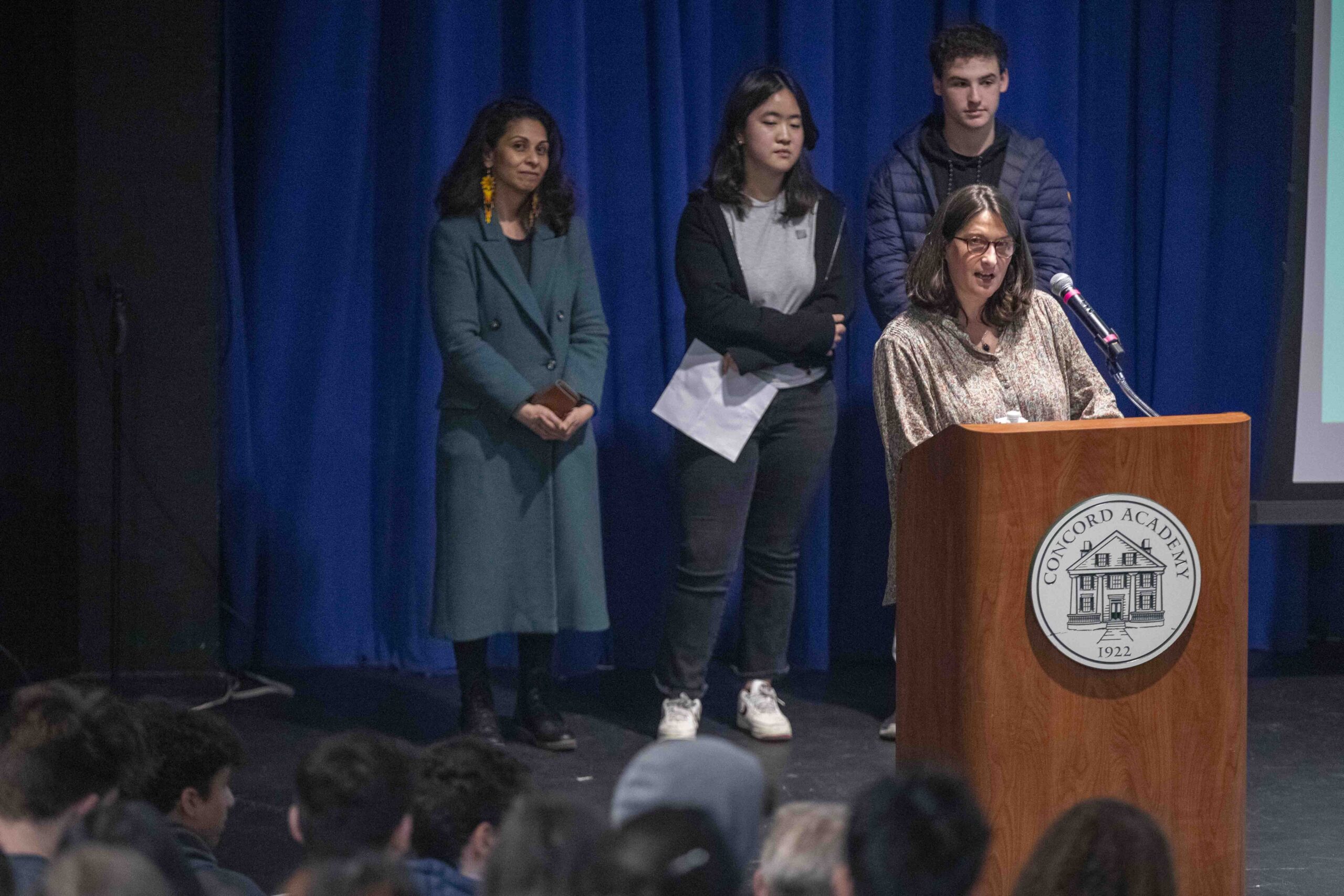
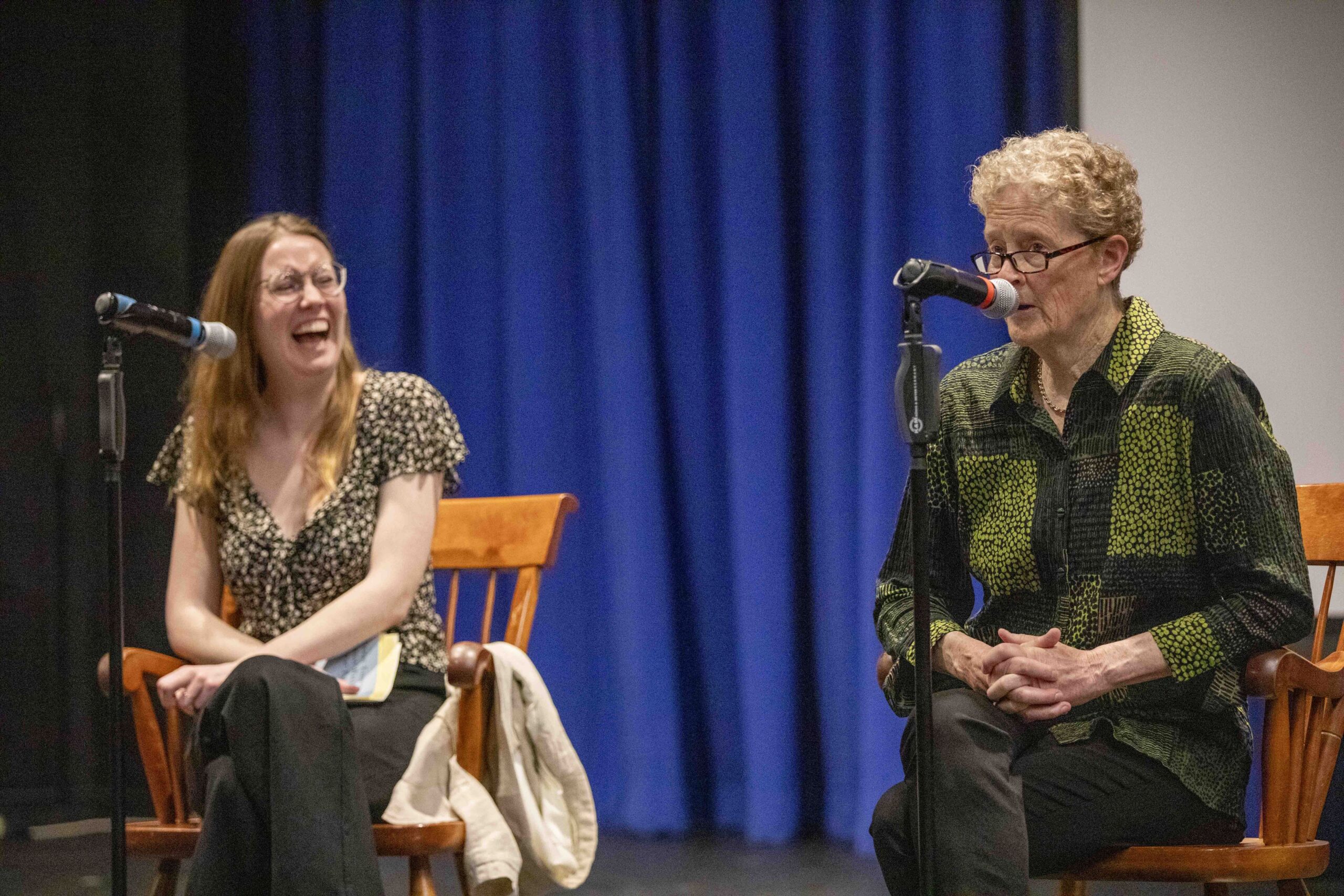
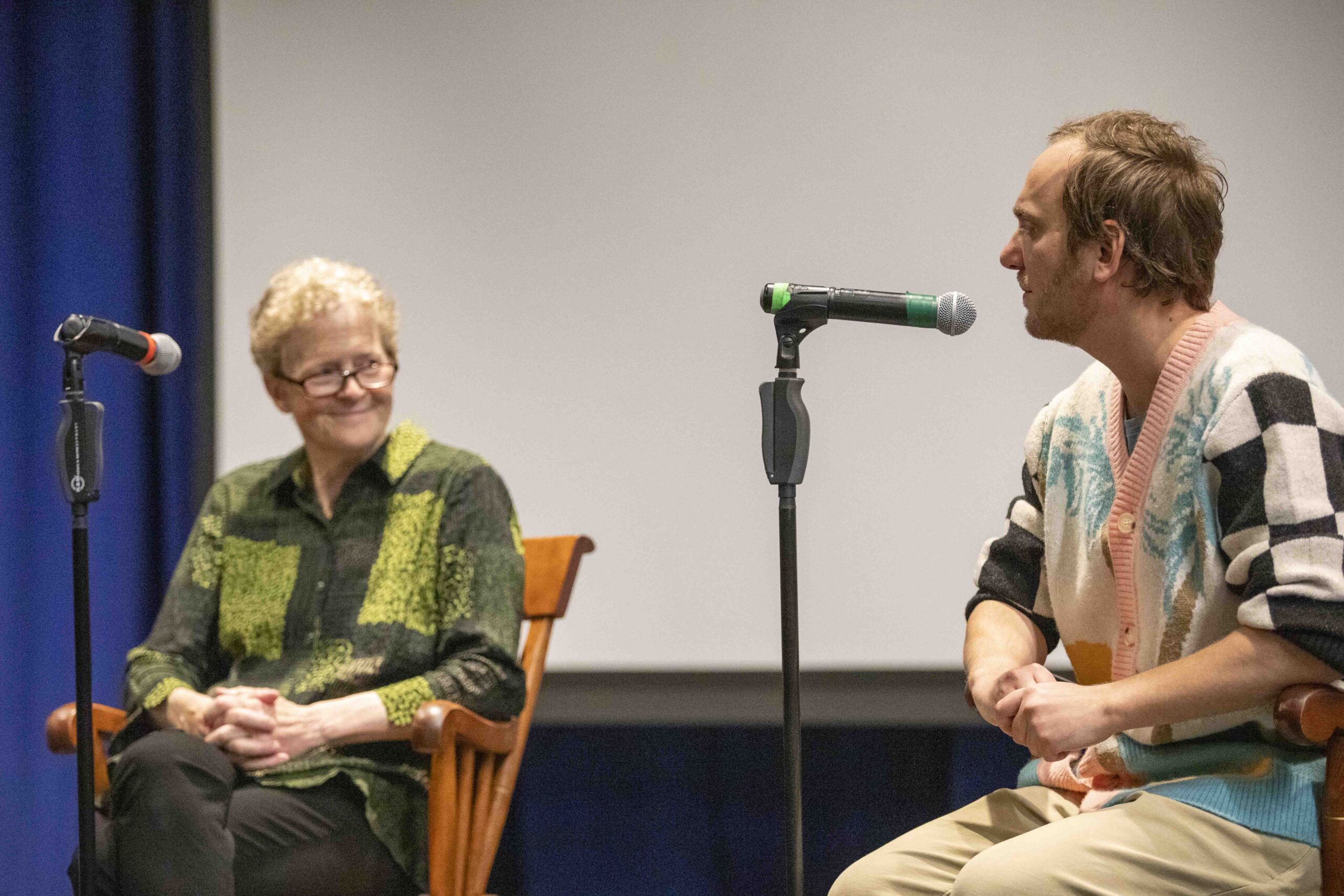
“Wow, fantastic, both of you—yes!” cheered Thomas, ever the teacher, as she approached the microphone last. She read several poems she had written about her father, whom she described as a “difficult person” who had provided her with much material, both exciting and terrifying. She also foregrounded her process, explaining the formal constraints and guidelines she had set for herself that had shaped some of her poems. “Sometimes awful things become beautiful because of their form,” she said. “It’s one of the functions of art.”
Following their readings, the three poets sat together on the stage, talking about their approaches to writing and revision. Stockman spoke about discovery—about writing as a way to engage the unconscious mind and generate questions, which he called ultimately “more fun” than answers. A poem begins for him when he has collected enough scraps from daily life in the Notes app on his phone that they begin to “talk to one another,” he said. “So much of natural life leads to poems if you make the poem available—it’s really about your attention.” Stockman shared some “tricks of the trade” for revision—formal strategies such as keeping every other line and a habit of setting poems aside for a long time before revisiting them—that have helped him strike a balance between intuition and intention and hear what rings true.
“We tend to want to tell nice stories about ourselves, but the reality isn’t always so nice,” Thomas said. “Sometimes if you trick yourself with what can seem like technical gimmicks, they reveal things that are very important.” She deconstructed the stages of revision of one of her poems that had evolved from a formal prompt: to write a favorite poem (she chose “After great pain, a formal feeling comes” by Emily Dickinson) backward, word by word, selecting words that most resonated, and then generate a new poem from them. She too emphasized the importance of discovery, throughout version after version: “Sometimes, maybe a lot of the time, you startle yourself, then realize what you just said by mistake.” She described how these kinds of writing prompts can generate “an intuitive override that is your friend, that jostles you out of your saneness—and that’s a great thing in art.”
Normile said her early resistance to formal constraints matured into a sense of generative play; now working within formal structures, far from constraining her, “opens things up.” An inveterate scribbler, Normile said she keeps a pen taped to the wall by her bed and a waterproof notebook in the shower. Answering a CA student who asked how she worked with humor without compromising depth, Normile shared that this question used to scare her. When she started reading her poems aloud in college and people thought they were funny, she said, she limited her poetry to a sort of standup comedy routine out of fear that she would compromise her ability to be funny. “It turned out, actually, that humor, for me, is a way to access vulnerability,” Normile said. “I was more able to write the difficult things, the things I was scared to turn toward, through humor.”
As time ran short, Thomas picked up the thread, reciting from memory Dickinson’s “Tell all the truth but tell it slant—.” As she said, “It’s good advice for artists too.”
